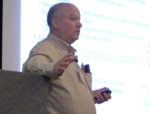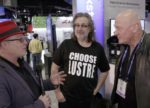http://orionx.net/wp-content/uploads/2022/04/021@HPCpodcas_Storage-with-Gary-Grider_20220420.mp3 Shahin and I are in violent agreement: if you’re interested in high performance storage, if major milestone in the development of HPC storage technology over the last 30-plus years interests you, if you want a peek at future forward leaps in HPC storage technology, then this is an @HPCpodcast episode for you. Our special […]
@HPCpodcast: HPC Storage Rock Star Gary Grider Talks How We Got Here and Where We’re Going
HPC: Stop Scaling the Hard Way
…today’s situation is clear: HPC is struggling with reliability at scale. Well over 10 years ago, Google proved that commodity hardware was both cheaper and more effective for hyperscale processing when controlled by software-defined systems, yet the HPC market persists with its old-school, hardware-based paradigm. Perhaps this is due to prevailing industry momentum or working within the collective comfort zone of established practices. Either way, hardware-centric approaches to storage resiliency need to go.
The Hyperion-insideHPC Interviews: Los Alamos’ Gary Grider Argues Efficiency in HPC Is King and Laments Simulation’s ‘Raw Deal’
It might surprise you to know that Gary Grider, HPC Division Leader at Los Alamos National Laboratory, is less interested in FLOPS than efficiency. In this interview, he explains why “FLOPS” hasn’t appeared in Los Alamos RFPs over the last decade. He also talks about his greatest HPC concern: decreasing interest in classical simulation in […]
OpenSFS Announces Lustre 2.13.0 Release
On December 5, OpenSFS announced Lustre 2.13.0 Release has been declared GA and is available for download. The Lustre file system is a open source, parallel file system that supports the requirements of leadership class HPC and Enterprise environments worldwide. Lustre provides a POSIX compliant interface and scales to thousands of clients, petabytes of storage, and has demonstrated over a terabyte per second of sustained I/O bandwidth. “New features include: Persistent Client Cache, Multi-Rail Routing, Overstriping, and self-extending layouts.”
Lustre Trademark Released to User Community
In this video from SC19, Stephen Simms from OpenSFS and Frank Baetke from EOFS announce the release of the Lustre trademark back to the Lustre community. “We are very pleased to have reached such an agreement with Seagate and are exited that from now on the Lustre community represented by EOFS and OpenSFS equally owns all the assets related to the URL lustre.org as well as the word LUSTRE and its design marks.”
DAOS: Scale-Out Software-Defined Storage for HPC/Big Data/AI Convergence
As an all-new parallel file system, DAOS will be a key component of the the upcoming Aurora supercomputer coming to Argonne National Laboratory in 2021. “DAOS is an open source software-defined scale-out object store that provides high bandwidth, low latency, and high I/O operations per second (IOPS) storage containers to HPC applications. It enables next-generation data-centric workflows that combine simulation, data analytics, and AI.”
HPE Scalable Storage for Lustre: The Middle Way
Lustre is a widely-used parallel file system in the High Performance Computing (HPC) market. It offers the performance required for HPC workloads, with its parallel design, flexibility, and scalability. This sponsored post explores HPE scalable storage and the Lustre parallel file system, and outlines ‘a middle ground’ available via solutions that offer the combination of Community Lustre within a qualified hardware solution.
Video: Whamcloud is Back – Lustre Today and Future
Robert Triendl from DDN gave this talk at ISC 2018. “With their new Whamcloud Business Unit, DDN has already brought key Lustre developers on board to accelerate their high performance computing solutions. The acquisition also enables DDN to expand Lustre’s leading position from HPC and Exascale into high growth markets such as analytics, AI and hybrid cloud.”
Eric Barton Joins DDN as CTO for Software-Defined Storage
Today DDN appointed Eric Barton as the company’s chief technology officer for software-defined storage. In this role, Barton will lead the company’s strategic roadmap, technology architecture and product design for DDN’s newly created Infinite Memory Engine business unit. Barton brings with him more than 30 years of technology innovation, entrepreneurship and expertise in networking, distributed systems and storage software.
Video: Tianhe-1A Supercomputer at Work
In this video, researchers describe how the Tianhe-1 supercomputer supports scientific research. “Currently #43 on the TOP500, the 2.56 Petaflop Tianhe-1A carries out 1,400 computing tasks per day. It is mainly used to serve universities, research institutions, small and medium-sized enterprises, and provide scientific computing services.”












